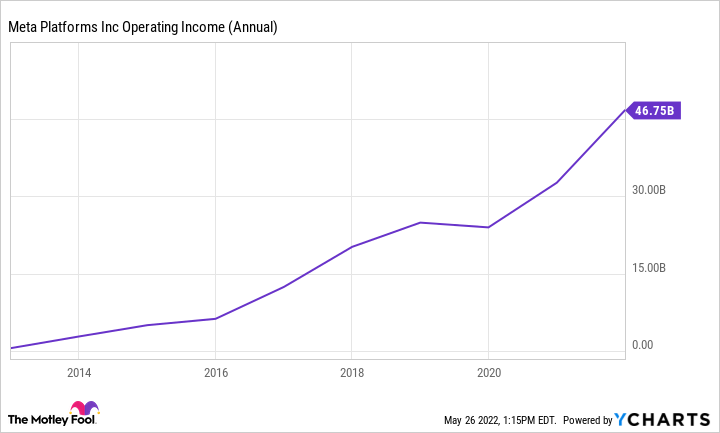Meta Platforms (META 0.43%) stock is facing several challenges. The Federal Reserve has started raising interest rates to counter rising inflation, a move that hurts growth stocks more than average. Additionally, Meta faces headwinds from Apple's (AAPL -0.35%) privacy changes and increasing competition. Finally, rising competition from ByteDance's Tiktok and other social media sites is slowing user growth and engagement.
The forces mentioned above have combined to reduced Meta's stock price by 50% off its highs hit in September 2021. At a much lower price, this social media giant is now attracting value-conscious investors wondering if Meta Platforms stock is a buy right now.

Image source: Getty Images.
Meta Platforms takes a meaningful share of the global ad market
For the last decade, Meta has increased revenue at a compound annual rate of 41.3%. The company's suite of social media products, including Facebook, Instagram, WhatsApp, and Messenger, has grown to boast 2.9 billion daily active users. The sites are free to join and use, making signing up easier, but there are plenty of free services for consumers to choose from. Despite being free for users, Meta has grown its operating income from $538 million to $46.7 billion from 2012 to 2021.
FB Operating Income (Annual) data by YCharts
Because users join for free, its massive scale should not be taken for granted. Its enormous size is what attracts advertisers who covet the opportunity to influence the 2.9 billion that visit the apps daily. Marketers spent $763 billion globally in 2021, up 22.5% from the prior year. To put that figure into context, Meta's revenue in 2021 was $118 billion (about 15.5%). Interestingly, marketers are increasing their spending on digital channels. Since folks spend more time on their phones, connected TVs, and laptops, marketers are moving their spending to where consumers are.
Moreover, investing in digital advertising lends itself well to measuring return on investment. Marketers on Meta's platforms can retrieve data such as how many folks clicked their ads and how many viewed them. That can be harder to discern from a billboard, radio, or newspaper placement.
The factors causing Meta's stock price to fall
The economic effects of the coronavirus pandemic and the government's response to it has spurred an ugly bout of outsized inflation. The Federal Reserve is working to get it back under control by raising interest rates. Asset prices are typically inversely related to interest rates and growth stocks like Meta Platforms tend to experience the inverse relationship by a larger magnitude. More of the value of the stock is derived from cash flows in later years, which is subject to a bigger discount when interest rates rise.
Exacerbating the problem for Meta, Apple last Fall changed its privacy policy for apps on its devices, making it more difficult for Meta to track user activity on mobile devices like the iPhone and iPad. The adjustment means the advertising Meta sells its partners is less targeted to the users that advertisers want. Until Meta can find a workaround, this will be a significant headwind as evidenced by Meta's report of a potential $10 billion drop in annual ad revenue that is tied to the privacy change.
Another challenge potential investors need to look out for is rising competition. ByteDance's Tiktok keeps gaining in popularity, and could soon attract more advertising dollars. Meta highlighted decreasing engagement from existing users as a consequence of this rise in competition for people's time.
What's more, e-commerce retailers are selling more digital ad inventory, increasing supply in the market and taking ad dollars away from Meta. If that wasn't bad enough, streaming content providers with hundreds of millions of subscribers have announced ad-supported versions coming out soon, a move to attract ad dollars to be sure and divide up the ad revenue pie further.
Meta alluded to some of these headwinds when it told investors that it expected a 7% growth in revenue for 2022. That would be the lowest rate of growth in the last decade and the first below double digits.
FB PE Ratio data by YCharts
These headwinds are all worked together to crash Meta's stock price. It's now selling at a price-to-earnings ratio of 14.4, and a price-to-free-cash-flow ratio of 13.5.
Meta is clearly facing headwinds and it will be a challenge to overcome them, but the relative bargain valuation suggests these headwinds are already priced into the stock. That makes the potential reward Meta can generate going forward worth the risk. And it means Meta Platforms stock is a buy right now for long-term investors.







